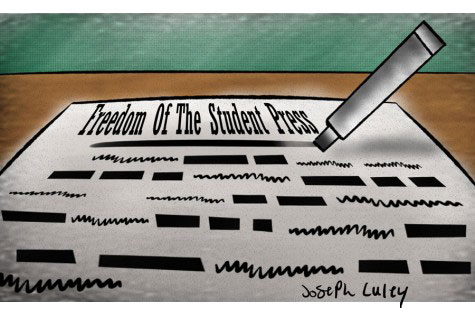North Star Take: For the Students, By the Students

Credit to Joe Luley
Missouri Representative Elijah Haahr proposed a bill that would allow college and high school student journalists the freedom to produce content they choose.
This bill, now awaiting House vote, is known as the Walter Cronkite New Voices Act. This bill was drafted after Jack Dalrymple, North Dakota’s current Governor, signed a similar bill known as the New Voices Act into law in April of 2015. We believe that this bill should be passed not just in Missouri, but in every state across the country because of the benefits it gives student journalists.
The Walter Cronkite New Voices Act gives student journalists freedom to produce any content they deem appropriate to their audiences, as long as it does not violate any state or national laws. Unlike many schools throughout the state and country, the school administration at FHN does not review or oversee any of the media that the student journalism department creates prior to its publishing. Other schools aren’t so lucky, and administrators review the publication before printing (prior review) and even keep material from being printed sometimes (prior restraint).
There are many reasons why censorship is detrimental to a student journalism environment. For instance, school publications have covered a variety of important, difficult and relevant topics including homosexuality, suicide, rape and divorce.
Often times, in schools that are subject to censorship, the staffers are unable to cover in-depth topics that affect their student body that are of great relevance and importance. School administrations deny publications the right to produce media that they believe would cause a disruption or spark controversial discussions at school.
However, what we all need to realize is that students must have the power to publish information relevant to their audience. If an article about suicide is published, the topic will more likely than not be discussed by many different students and teachers when it is released.
It is important to realize that these are the types of issues that high schoolers face in reality. Topics that need to be discussed and not hidden to pretend like they don’t exist.
According to the Jason Foundation, over 5,400 children between the seventh and 12th grade attempt suicide each day. With such an overwhelming number, there is no reason that students should be shielded from topics such as suicide.
In addition, coverage of these topics by media can actually help students who may be struggling with these issues by informing them about where and how to get help.
Furthermore, school publications are produced for the students, by the students. Young journalists should be trusted to make responsible decisions for themselves. They need to learn from experience. By allowing students the opportunity to discuss and plan coverage of various topics, journalists learn to take a step back and think about all of the potential harms and benefits that could result from publishing their content. If they don’t learn about how their writing affects their school community, how will they be able to make educated decisions about the content they push out later in life? When else will they be given the opportunity to learn how? They won’t.
Finally, we must realize that the majority of the time, students have heard of the frequently discussed controversial topics, but often, they only have a surface-level understanding of them. Nevertheless, simply knowing of a topic is not enough in order to be fully informed.
It is the student journalism department’s obligation to ensure that their student body is well-informed about the issues that high schoolers face daily, and about what is going on in the world around them.
Student journalists cannot fulfill their duty if their school administration is overshadowing them.
If the Walter Cronkite New Voices Act is passed, the proposed date that the bill will be effective is Aug. 28 of this year. We believe that this bill should be passed by the House and Senate, then signed into law by Governor Jay Nixon so that student journalists can cover relevant topics that affect their peers and community without a fear of censorship or condemnation.
Editor’s Note: As of Wednesday, March 16, the Walker Cronkite New Voices Act was passed in the House and is now awaiting Senate approval.
Your donation will support the student journalists of Francis Howell North High School. Your contribution will allow us to purchase equipment and cover our annual website hosting costs.





![It’s Time To Come Together [Editorial]](https://FHNtoday.com/wp-content/uploads/2024/03/Untitled_Artwork-1-600x324.jpg)
![The New Board of Education Social Media Updates Are Outdated [Editorial]](https://FHNtoday.com/wp-content/uploads/2024/01/new-policy-ed-cartoon-600x325.png)
![It’s Time to Update Missouris Sex Education Regulations [Editorial]](https://FHNtoday.com/wp-content/uploads/2023/11/Untitled_Artwork-600x347.jpeg)
![Francis Howell Board of Education to Review Racism Resolution [Editorial]](https://FHNtoday.com/wp-content/uploads/2023/10/Ed-Cartoon_Manfull_10.11.23-600x373.png)

